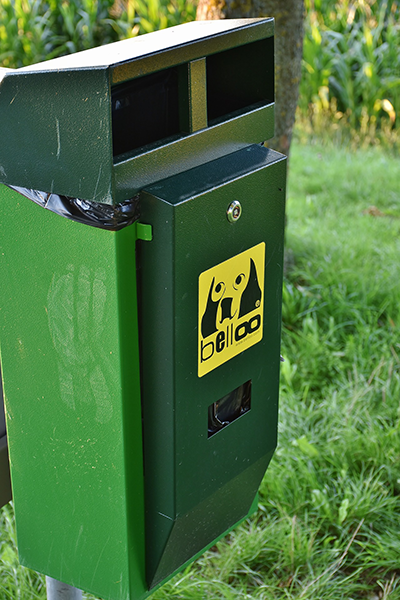[et_pb_section bb_built=”1″ inner_width=”90%” inner_max_width=”1086px”][et_pb_row][et_pb_column type=”3_4″ custom_padding__hover=”|||” custom_padding=”|||”][et_pb_text admin_label=”Journalist Story” _builder_version=”3.17.6″]
 The sun is beaming down, warming your skin. A cool summer breeze brushes through your hair and there isn’t a cloud in sight, you are walking along a park path… when you step right into something squishy. Dog poo.
The sun is beaming down, warming your skin. A cool summer breeze brushes through your hair and there isn’t a cloud in sight, you are walking along a park path… when you step right into something squishy. Dog poo.
Nobody likes to see, smell or step in dog poo when enjoying a day out – trying to avoid it in parks can sometimes feel like walking through a minefield, but generally people do clean up after their dogs. While on a day out shooting, do the same rules apply on picking up after your dog? Surely it doesn’t matter if it’s done within long grass, where people are unlikely to walk?
It actually matters more than you think.
Dogs usually eat a diet consisting of vegetables and meat. Gundogs have a lot of meat in their diet because of their requirement to build lots of muscle for long shoots, so as a result, dog waste doesn’t get decomposed as easily as herbivores’. Cows are a good example of herbivores, meaning that they only eat grass and organic matter. Since cow manure is plant based, it can be biologically digested by bacteria over a period of months. During this process of decomposition, the bacteria can give off products which fertilise the grass. However, dog poo can take up to a year to be fully decomposed and, during this time, a high nitrogen and phosphorus content within the dog’s diet will leach out of the waste and essentially burn the organic matter, like grass, around it.
The worse is still yet to come – a gram of dog poo has been found to hold up to 23 million bacteria within it. These bacteria could potentially include E coli, giardia and salmonella and remember, the bacteria can all be transferred to humans and other animals like other dogs and sheep. If a single animal gets infected, this can be transmitted to whole herds and the animals’ meat might even be eaten by humans later. Bacteria can remain in faeces for several years. Even if the faeces become decomposed, bacteria can still survive around the site within the ground.
So, how can we combat this? Simply pick up after your dog. There are alternatives to using plastic bags, which are eco-friendlier. Water-soluble waste bags have been seen on the rise in popularity because they can be flushed down the toilet as soon as you get home. These bags are very effective at disposing dog waste since the bag decomposes as soon as it is surrounded by water (don’t worry, it takes time to decompose fully, it won’t fall apart in your pocket!) and is not harmful to aquatic life after its decomposition either. After the plastic bag decays, the dog waste gets treated just like human waste. However, never flush dog waste into a septic tank.
One misleadingly named bag that is popular is the biodegradable bag. This bag requires oxygen from the air to break down and decompose. If the bag is exposed to oxygen, it has been seen to be very effective. However, once it lands in a landfill, it may be buried under tonnes and tonnes of waste. As a result, oxygen cannot reach the bag to decompose it. The waste will not degrade either; it will essentially “mummify” within the bag. This makes biodegradable bags no different to plastic bags in this situation.
It’s as simple as picking it up and binning it! And think about what bags to buy next time you visit a pet shop.
You can also buy the flushable bags online, either on Amazon or many other websites, such as here
[/et_pb_text][/et_pb_column][et_pb_column type=”1_4″ custom_padding__hover=”|||” custom_padding=”|||”][et_pb_sidebar _builder_version=”3.17.6″ area=”et_pb_widget_area_19″ orientation=”right” /][/et_pb_column][/et_pb_row][et_pb_row][et_pb_column type=”4_4″ custom_padding__hover=”|||” custom_padding=”|||”][et_pb_team_member admin_label=”YS-Journalist Spencer Barber Bio” _builder_version=”3.27.3″ name=”Spencer Barber” position=”Young Shot Journalist” image_url=”https://0ld.basc.org.uk/wp-content/uploads/2018/12/Spencer-Barber-profile-pic.jpg” custom_css_member_image=”width: 200px;” module_class=”ys-journalists-bio” custom_css_main_element=”border-top: 2px solid #078463;||border-bottom: 2px solid #078463;||border-right: 0px solid transparent; ” saved_tabs=”all” box_shadow_horizontal_image_tablet=”0px” box_shadow_vertical_image_tablet=”0px” box_shadow_blur_image_tablet=”40px” box_shadow_spread_image_tablet=”0px” text_shadow_horizontal_length=”text_shadow_style,%91object Object%93″ text_shadow_horizontal_length_tablet=”0px” text_shadow_vertical_length=”text_shadow_style,%91object Object%93″ text_shadow_vertical_length_tablet=”0px” text_shadow_blur_strength=”text_shadow_style,%91object Object%93″ text_shadow_blur_strength_tablet=”1px” header_text_color=”#078463″ header_text_shadow_horizontal_length=”header_text_shadow_style,%91object Object%93″ header_text_shadow_horizontal_length_tablet=”0px” header_text_shadow_vertical_length=”header_text_shadow_style,%91object Object%93″ header_text_shadow_vertical_length_tablet=”0px” header_text_shadow_blur_strength=”header_text_shadow_style,%91object Object%93″ header_text_shadow_blur_strength_tablet=”1px” body_text_shadow_horizontal_length=”body_text_shadow_style,%91object Object%93″ body_text_shadow_horizontal_length_tablet=”0px” body_text_shadow_vertical_length=”body_text_shadow_style,%91object Object%93″ body_text_shadow_vertical_length_tablet=”0px” body_text_shadow_blur_strength=”body_text_shadow_style,%91object Object%93″ body_text_shadow_blur_strength_tablet=”1px” body_link_text_shadow_horizontal_length=”body_link_text_shadow_style,%91object Object%93″ body_link_text_shadow_horizontal_length_tablet=”0px” body_link_text_shadow_vertical_length=”body_link_text_shadow_style,%91object Object%93″ body_link_text_shadow_vertical_length_tablet=”0px” body_link_text_shadow_blur_strength=”body_link_text_shadow_style,%91object Object%93″ body_link_text_shadow_blur_strength_tablet=”1px” body_ul_text_shadow_horizontal_length=”body_ul_text_shadow_style,%91object Object%93″ body_ul_text_shadow_horizontal_length_tablet=”0px” body_ul_text_shadow_vertical_length=”body_ul_text_shadow_style,%91object Object%93″ body_ul_text_shadow_vertical_length_tablet=”0px” body_ul_text_shadow_blur_strength=”body_ul_text_shadow_style,%91object Object%93″ body_ul_text_shadow_blur_strength_tablet=”1px” body_ol_text_shadow_horizontal_length=”body_ol_text_shadow_style,%91object Object%93″ body_ol_text_shadow_horizontal_length_tablet=”0px” body_ol_text_shadow_vertical_length=”body_ol_text_shadow_style,%91object Object%93″ body_ol_text_shadow_vertical_length_tablet=”0px” body_ol_text_shadow_blur_strength=”body_ol_text_shadow_style,%91object Object%93″ body_ol_text_shadow_blur_strength_tablet=”1px” body_quote_text_shadow_horizontal_length=”body_quote_text_shadow_style,%91object Object%93″ body_quote_text_shadow_horizontal_length_tablet=”0px” body_quote_text_shadow_vertical_length=”body_quote_text_shadow_style,%91object Object%93″ body_quote_text_shadow_vertical_length_tablet=”0px” body_quote_text_shadow_blur_strength=”body_quote_text_shadow_style,%91object Object%93″ body_quote_text_shadow_blur_strength_tablet=”1px” position_text_shadow_horizontal_length=”position_text_shadow_style,%91object Object%93″ position_text_shadow_horizontal_length_tablet=”0px” position_text_shadow_vertical_length=”position_text_shadow_style,%91object Object%93″ position_text_shadow_vertical_length_tablet=”0px” position_text_shadow_blur_strength=”position_text_shadow_style,%91object Object%93″ position_text_shadow_blur_strength_tablet=”1px” box_shadow_horizontal_tablet=”0px” box_shadow_vertical_tablet=”0px” box_shadow_blur_tablet=”40px” box_shadow_spread_tablet=”0px” z_index_tablet=”500″]
I’m 18-year-old A-level student from rural Devon. The countryside will always be a crucial part of me. I spent most of my childhood outside with friends, building dens, climbing trees and exploring the countryside which felt like an uncharted wilderness.
A fundamental part of my growing up was learning how to use guns and knives responsibly; I now respect them as essential tools. I didn’t learn hunting as a cruel, outdated endeavour; I learned hunting as a way to maintain the bond between countryman and countryside. However, this way of life is threatened by increasingly intolerant views based on simple misunderstanding. For many, the countryside is redundant, hunting is cruel and the people who live there nothing more than tourist attractions. This is why in my article I call for greater opportunity to be given to people who’ve never experienced the world I live in, so they can learn to appreciate rural Britain too.
[/et_pb_team_member][/et_pb_column][/et_pb_row][/et_pb_section]